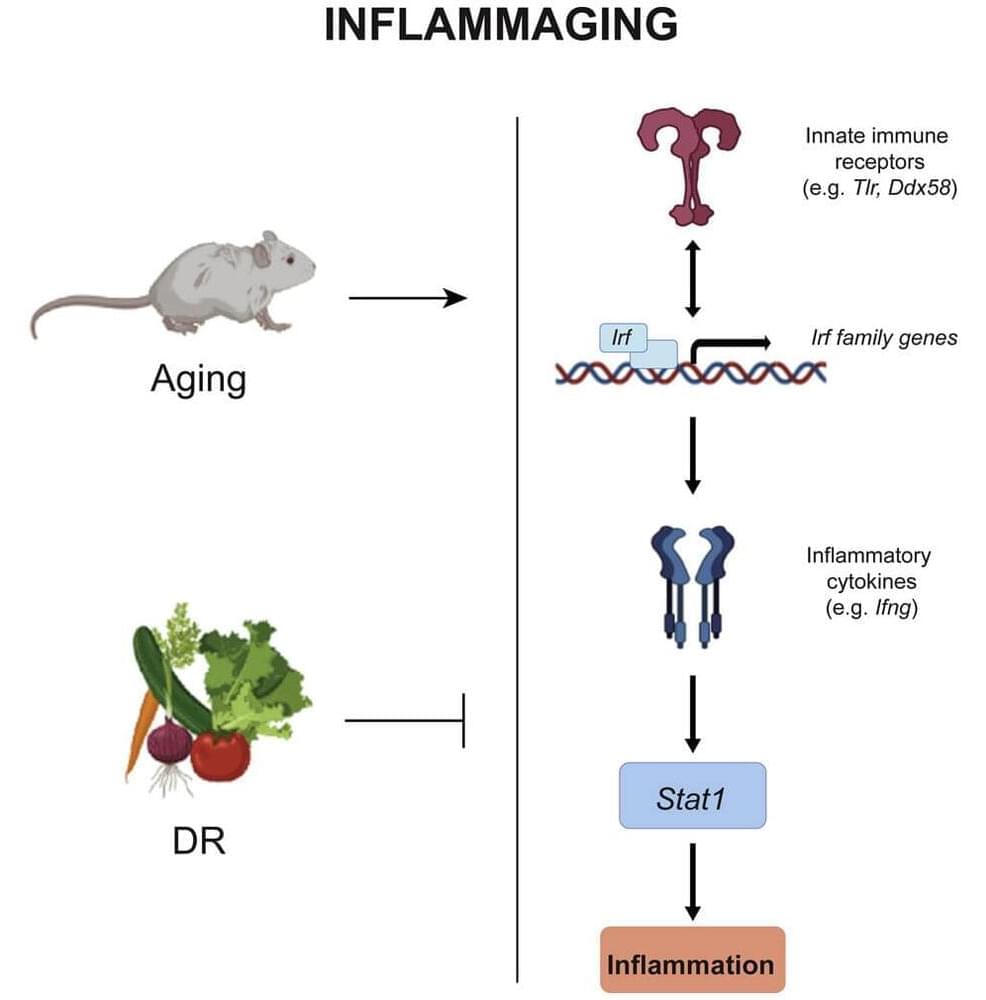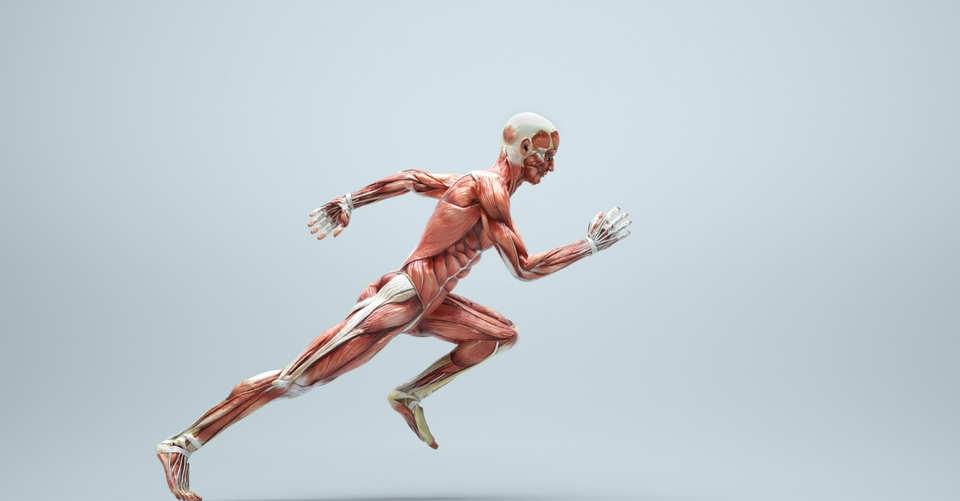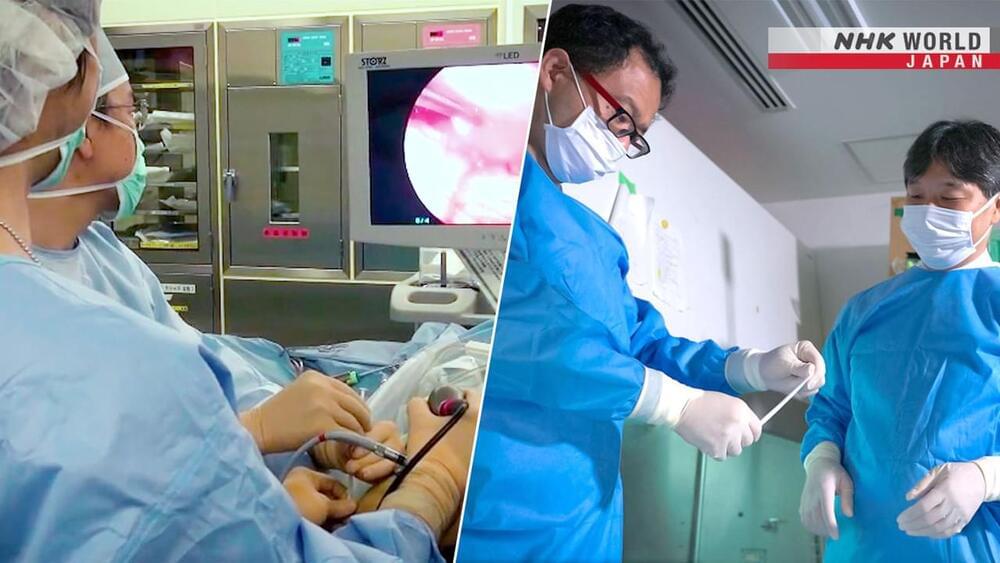Category: life extension – Page 291
A genetically encoded tool to increase cellular NADH/NAD+ ratio in living cells
Impaired reduction/oxidation (redox) metabolism is a key contributor to the etiology of many diseases, including primary mitochondrial disorders, cancer, neurodegeneration, and aging. However, mechanistic studies of redox imbalance remain challenging due to limited strategies which can perturb cellular redox metabolism and model pathology in various cellular, tissue, or organismal backgrounds without creating additional and potentially confounding metabolic perturbations. To date, most studies involving impaired redox metabolism have focused on oxidative stress and reactive oxygen species (ROS) production; consequently, less is known about the settings where there is an overabundance of reducing equivalents, termed reductive stress. NADH reductive stress has been modeled using pharmacologic inhibition of the electron transport chain (ETC) and ethanol supplementation. Still, both these methods have significant drawbacks. Here, we introduce a soluble transhydrogenase from E. coli (Ec STH) as a novel genetically encoded tool to promote NADH overproduction in living cells. When expressed in mammalian cells, Ec STH, and a mitochondrially-targeted version (mito Ec STH), can elevate the NADH/NAD+ ratio in a compartment-specific manner. Using this tool, we determine the metabolic and transcriptomic signatures of NADH reductive stress in mammalian cells. We also find that cellular responses to NADH reductive stress, including blunted proliferation, are dependent on cellular background and identify the metabolic reactions that sense changes in the cellular NADH/NAD+ balance. Collectively, our novel genetically encoded tool represents an orthogonal strategy to perturb redox metabolism and characterize the impact on normal physiology and disease states.
The authors have declared no competing interest.

How are inflammation, aging and diet related? The systemic regulatory network described for the first time
Mild, persistent inflammation in tissue is considered one of the biological hallmarks of the aging process in humans—and at the same time is a risk factor for diseases such as Alzheimer’s or cancer. Prof. Francesco Neri and Dr. Mahdi Rasa of the Leibniz Institute on Aging—Fritz Lipmann Institute (FLI) in Jena have succeeded for the first time in describing at the molecular level the regulatory network that drives the general, multiple-organ inflammatory response. Moreover, they were able to show that dietary restriction can influence this regulatory circuit, thereby inhibiting inflammation.
Inflammation is an immune response of the body that is, in itself, useful: our immune system uses it to fight pathogens or to remove damaged cells from tissue. Once the immune cells have done their work, the inflammation subsides: the infection is over, the wound is healed. Unlike such acute inflammations, age-related chronic inflammation is not local. The innate immune system ramps up its activity overall, resulting in chronic low-grade inflammation. This aging-related inflammation is also known as inflammaging.
Aubrey de Grey on why Aubrey 3.0 is about racing towards milestones and a brand-new foundation
That was Aubrey de Grey, this is Aubrey de White. New foundation, new therapy tests.
Co-founder of the SENS Foundation, Dr Aubrey de Grey is the co-organiser of this week’s Longevity Summit Dublin 2022; he was keynote speaker at this week’s summit, speaking on Robust Mouse Rejuvenation: real soon now? and featuring on the panel discussion Blank Cheque, which also enjoyed contributions from our own Phil Newman, Michael West, Tom Weldon, Greg Grinberg and Evelyne Bischof.
But most excitingly, Dr de Grey used the platform of Longevity Summit Dublin to launch his new foundation; its Board of Directors already boasts Greg Grinberg as Executive Chair, Daria Khaltourina, Martin O’Dea (also Events Director), Gennady Stolyarov and David Wood.
Dr de Grey has always been a passionate advocate of longevity research and biotechnology, so it’s no surprise his energy and enthusiasm has driven him to create a new foundation.
Visit Longevity. Technology — https://bit.ly/3PwtH8Y
Dr. Ralph Merkle — Nanotechnology & Cryonics — Preserving Ourselves for the Future
Ralph C. Merkle is a computer scientist. He is one of the inventors of public key cryptography, the inventor of cryptographic hashing, and more recently a researcher and speaker of cryonics.
Videos in the talk: David Eagleman https://www.youtube.com/watch?v=-5tZtYns6kE molecular nanotechnology: https://www.youtube.com/watch?v=zqyZ9bFl_qg.
Filmed 2017/04/30


‘Immortality Is My Goal’: 11-Year-Old Boy Gets Bachelor’s Degree In Physics
Eleven-year-old Simons only took a year to complete his bachelor’s degree, which usually takes at least three years.
In a conversation with the Dutch daily De Telegraaf, Simons said that, “I don’t really care if I’m the youngest.” “It’s all about getting knowledge for me.”
“This is the first puzzle piece in my goal of replacing body parts with mechanical parts,” Simons said.

Aubrey de Grey is working to cure aging whether you like it or not
Don’t think about living forever. Just think about never getting sick, ever again.
At least that’s how Aubrey de Grey would like you to contextualize his work. The notoriously bearded biomedical gerontologist is the scientific spark that lights up so many all-caps “immortality” headlines. De Grey wants to increase human longevity so significantly that death could become a thing of the past, a condition people fell prey to before they developed the medical technology to stop it. It’s been the center of his work for approximately 20 years.
De Grey started as a software guy at the genetics department of Cambridge University in 1992, maintaining a database of genetic information on fruit flies. In 1999 he published a book called “The Mitochondrial Free Radical Theory of Aging,” where he first laid out the key idea we know him for today: preventing damage to mitochondrial DNA ought to make people live much longer. The idea was so well-received that Cambridge awarded him a PhD the following year. De Grey condensed his thesis to a sound byte in a 2007 interview: “[Humans] are machines, and aging is the wearing out of a machine, the accumulation of damage to a machine, and hence potentially fixable.”

UNITY Biotechnology Completes Enrollment in Phase 2 ENVISION Study of UBX1325 in Wet Age-related Macular Degeneration
Enrollment of 51 patients exceeds target by ~10% due to high interest in the study
SOUTH SAN FRANCISCO, Calif., Sept. 19, 2022 (GLOBE NEWSWIRE) — UNITY Biotechnology, Inc. (“UNITY”) [NASDAQ: UBX], a biotechnology company developing therapeutics to slow, halt, or reverse diseases of aging, has completed enrollment for the ENVISION study, its Phase 2 clinical trial of UBX1325 in patients with wet age-related macular degeneration (AMD). This is an active comparator study, examining the efficacy of two doses of UBX1325 compared to every other month treatment with aflibercept through 24 weeks.

Cutting-Edge Regenerative Medicine for the Knees
We look at the latest in regenerative medicine for treating knee problems. Osteoarthritis happens when the meniscus and cartilage wear out. Researchers aim to repair meniscal damage with autologous synovial stem cell transplants. Ligament tears, an injury common among athletes, are also usually treated with transplants using the patient’s own tendons or artificial ligaments. A bovine tendon has successfully been transplanted into a sheep, and a clinical trial will soon begin for use in humans.